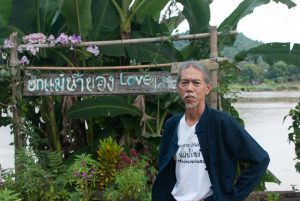A Thai environmental activist who successfully campaigned against a China-led Mekong River channel deepening project is among the recipients of the 2022 Goldman Environmental Prize. Niwat Roykaew is the head of the grassroots environmental group Rak Chiang Khong, which has campaigned for years against plans to blast away rapids along the middle Mekong to allow the passage of Chinese cargo vessels, and his efforts were crucial in the Thai cabinet’s decision to terminate the project in February 2020.
“The official cancellation of the Mekong rapids blasting project marks a rare, formal win in a region facing substantial pressure from development projects and is a testament to the collective power of Kru Thi’s campaign,” the Goldman Prize committee said of Niwat, referring to him by his popular nickname, which translates as “teacher Ti.”
It added, “By amplifying the voices of local people in articulating the Mekong’s environmental, social, and cultural value, he forced the Thai government to pay attention to civil society and increased its accountability to its citizens.” According to its website, the Goldman Prize, named after the U.S. philanthropists Richard and Rhoda Goldman, “recognizes individuals for sustained and significant efforts to protect and enhance the natural environment, often at great personal risk.” Niwat was one of six environmental campaigners recognized in 2022.
The Mekong blasting plan was initiated in 2000, China, Thailand, Laos, and Myanmar signed an agreement to transform the middle stretches of the river into a conduit for trade between Thailand and southern China. Between 2000 and 2002, Chinese work teams cleared most of the major obstructions in the river between southern China and the port town of Chiang Saen in northern Thailand. A thriving river trade sprang up between the two nations, particularly in agricultural goods. But the Thai government suspended the planned clearance further downstream in 2003, concerned about possible alterations to its riverine border with Laos.
In late 2016, however, the project was revived, with the aim of deepening this navigation channel in order to permit year-round passage by 500-ton cargo boats. (Currently, river traffic comes to a near-halt in the dry season months, especially as the region has experienced longer and more intense droughts). The modifications would also have extended the channel southward, effectively transforming the middle stretch of the Mekong into a 650-kilometer cargo highway running from Yunnan to Luang Prabang, the former royal capital of Laos.
Niwat was active in the campaign against the first stage of blasting and to protest its resumption, led boat demonstrations on the Mekong to protest the blasting and met with fishermen in both Thailand and Laos. He also encouraged villagers to sign a petition that was delivered to the Chinese embassy in Bangkok. As the Goldman committee noted, Niwat’s local organizing compelled both government officials and the Chinese developer to travel to Chiang Kong to meet with him and his colleagues.
Much of Rak Chiang Khong’s advocacy focused on plans to dynamite the Khon Pi Long rapids, a 1.6-kilometer stretch of rocks, cataracts, and submerged shoals lying between Thailand’s Chiang Khong district and a remote part of northern Laos.
According to Niwat, the destruction of Khon Pi Long would have eliminated an important sanctuary for numerous species of birds and fish, and undercut the livelihoods of thousands of people living in the surrounding area. When I visited Niwat at his community school in Chiang Khong in late 2018, he told me that clearing the shoals and rapids would be akin to “taking the heart out of the Mekong.” He added, “Blasting the rapids is very dangerous. It can kill the Mekong River.”
In March 2019, after months of protests, the Chinese government announced that it was pausing its Mekong blasting plans, prompting the Thai government to definitively cancel the project the following year.
As the Goldman Prize committee noted, such victories are rare indeed in the lands along the Mekong, which have been transformed by breakneck development since the end of the Cold War, both for good and for ill. Among the most concerning is the river itself, which is currently suffering under the combined pressure of climate change and ill-considered hydropower developments, threatening the 65 million people who rely on the river. Niwat’s success in this instance suggests that despite the generally authoritarian nature of the governments on the lower Mekong (to say nothing of China), the little people can still prevail.

































